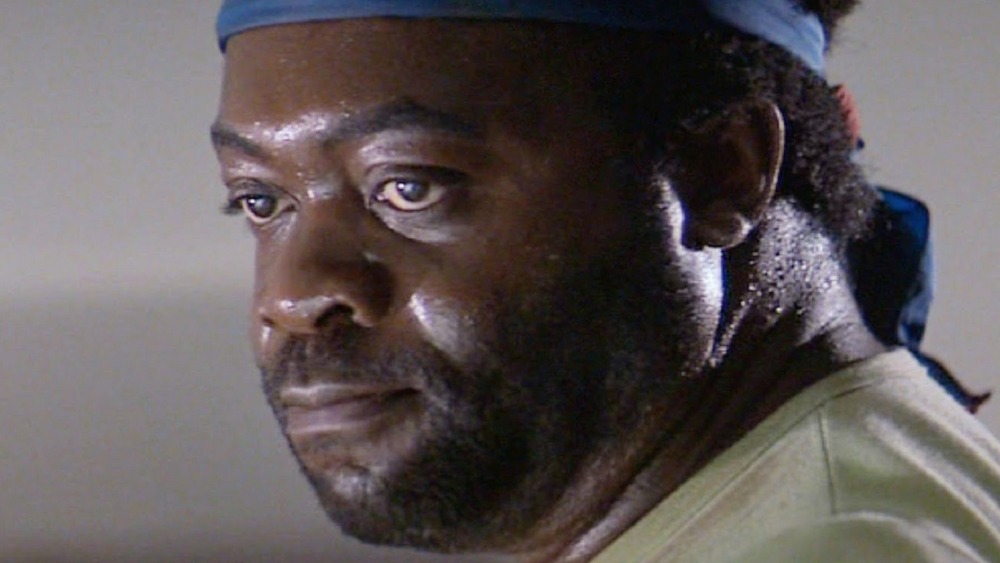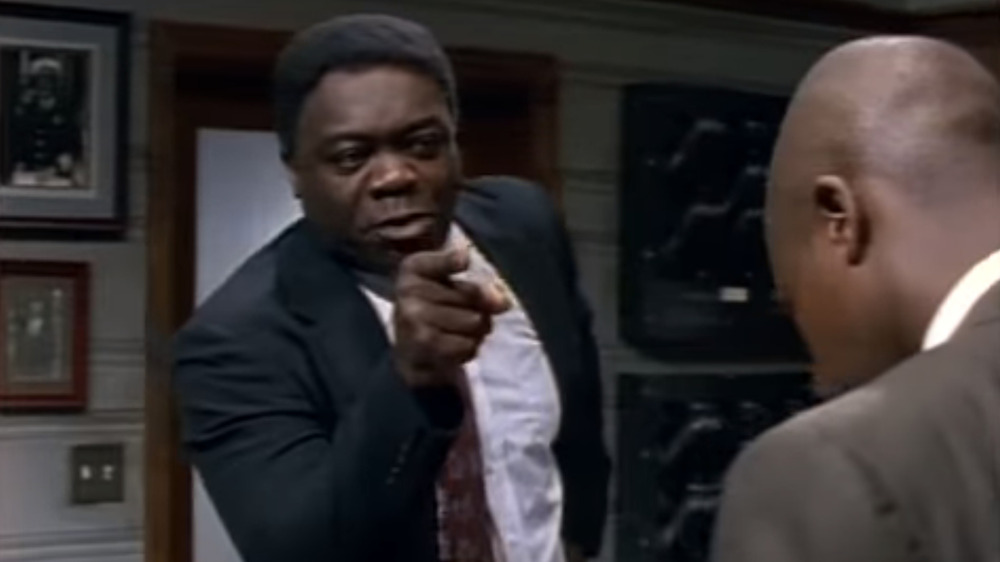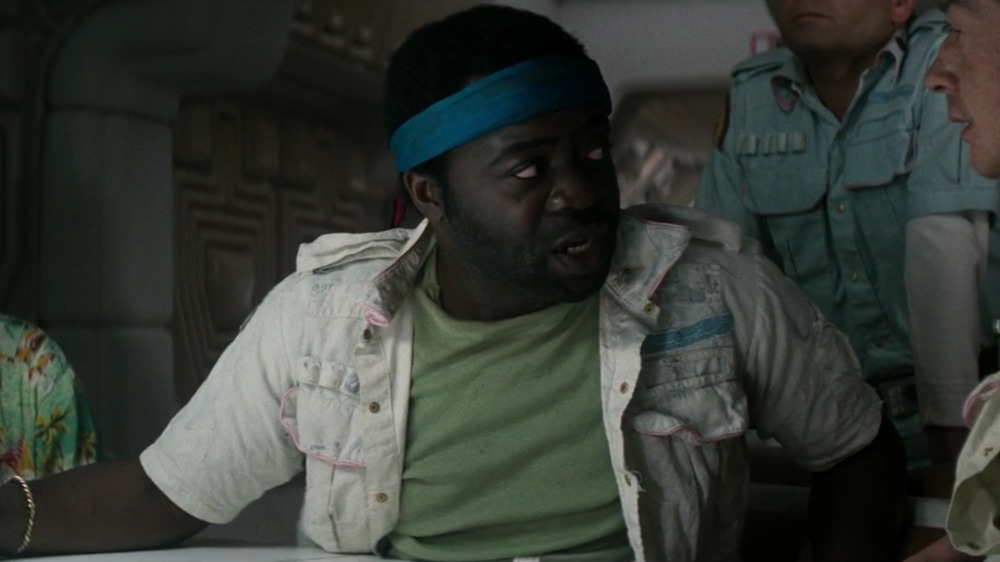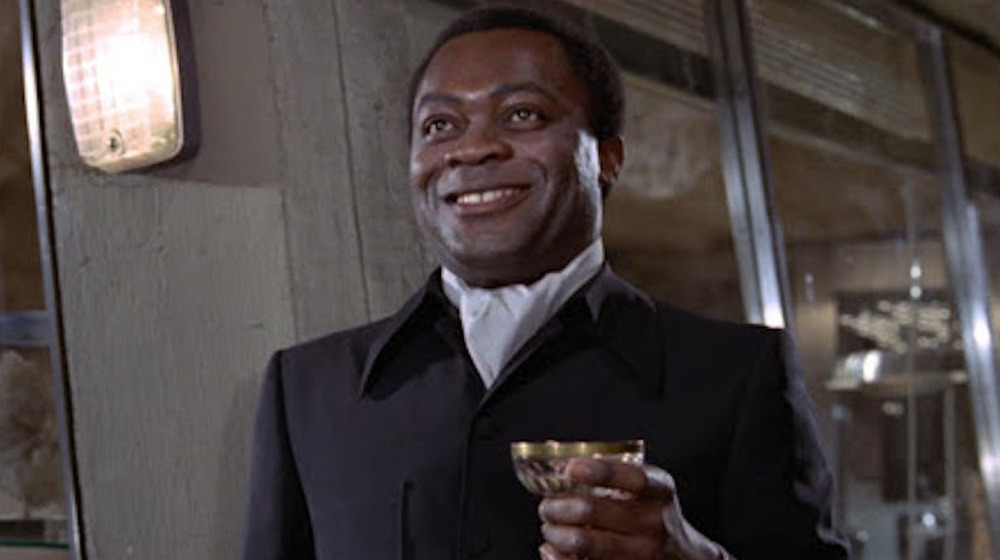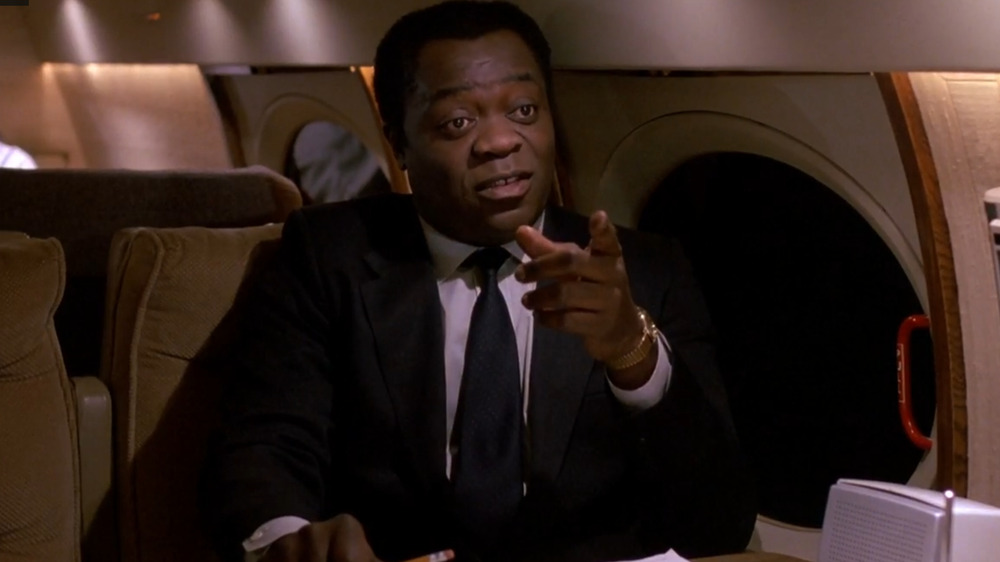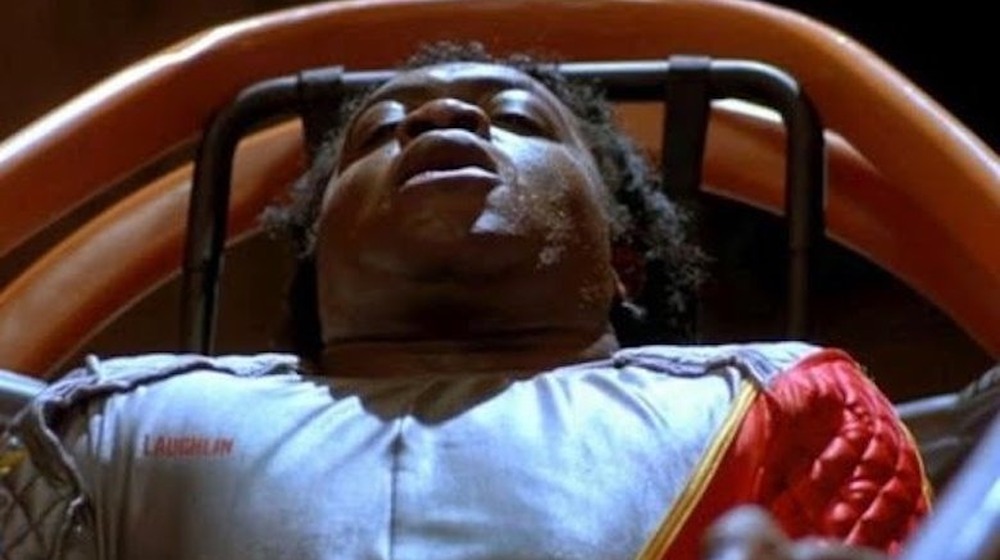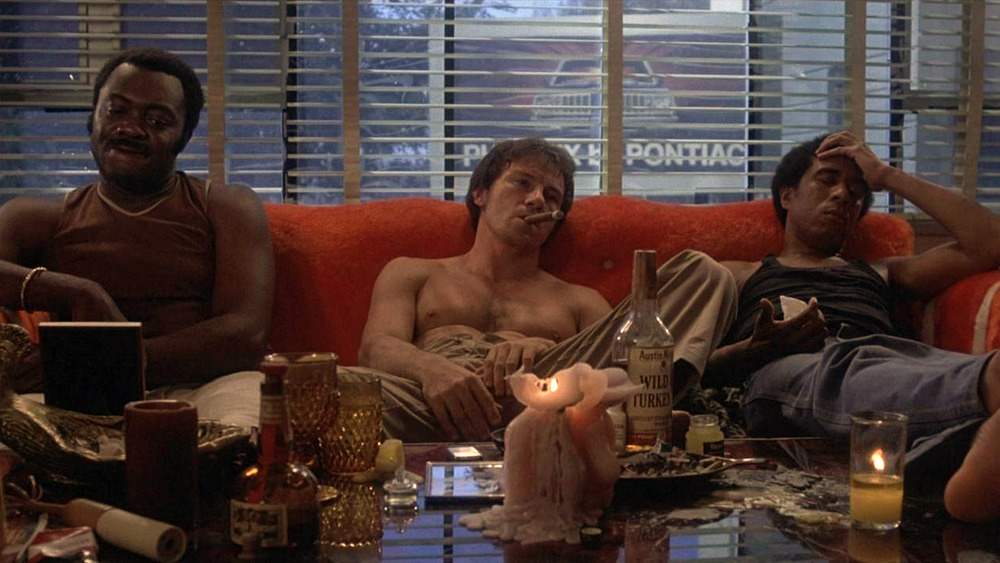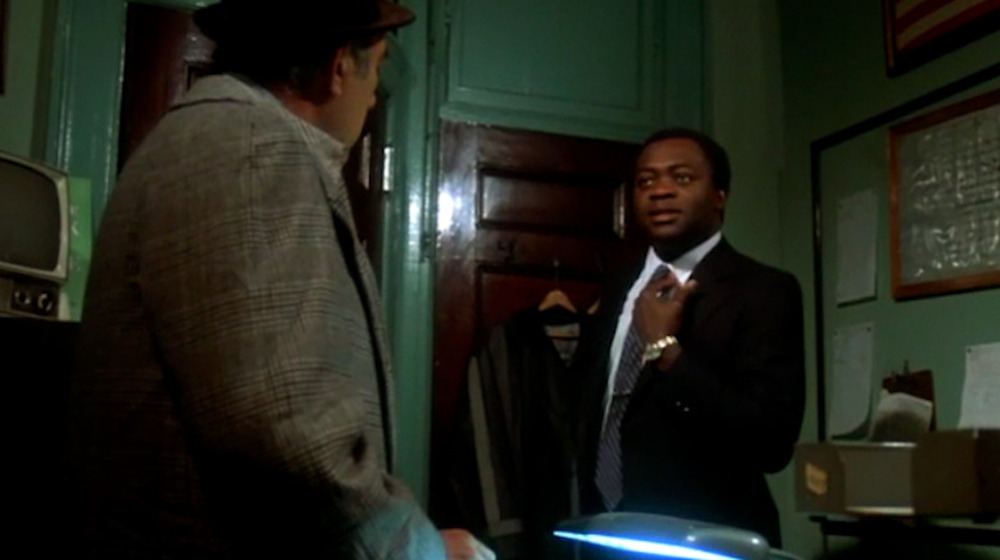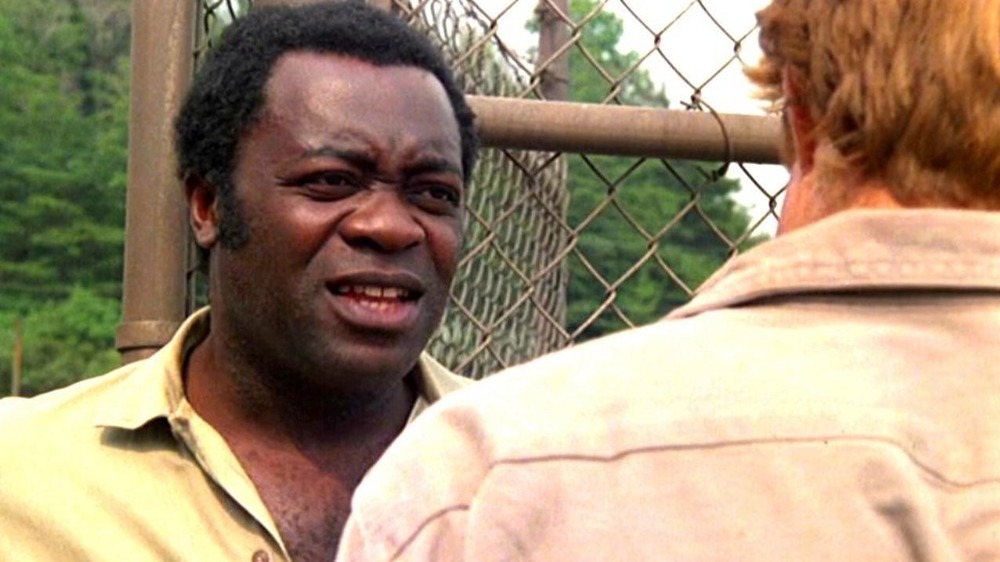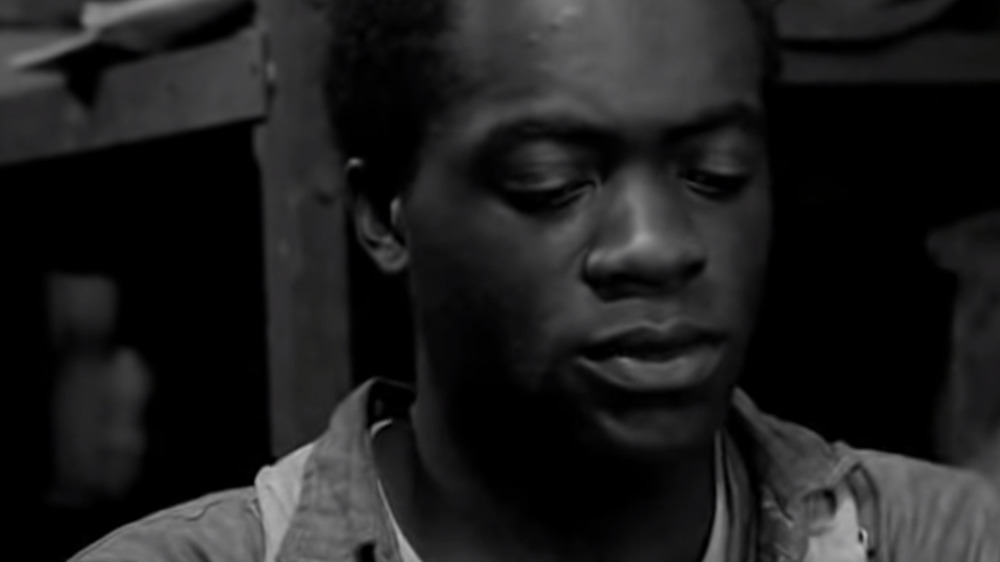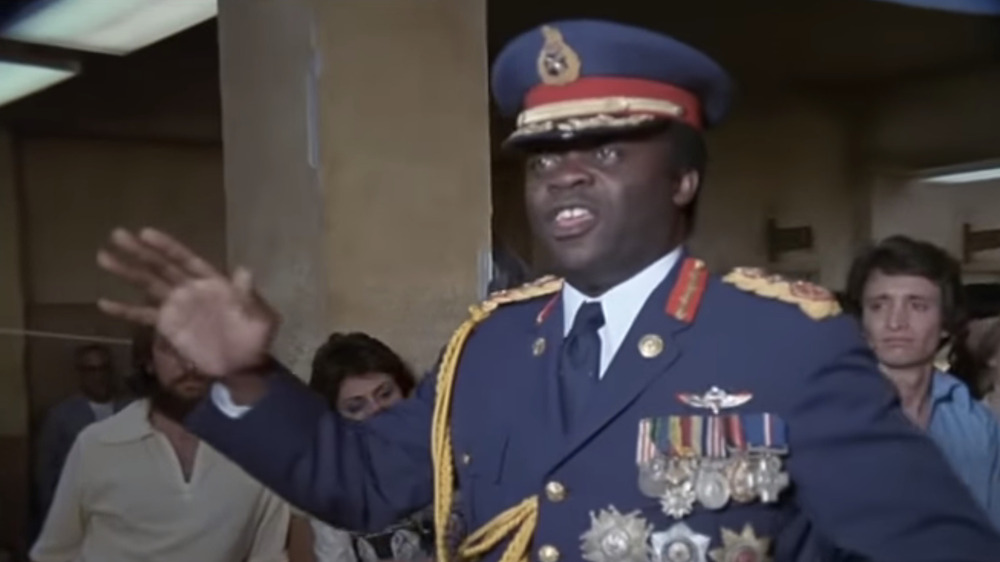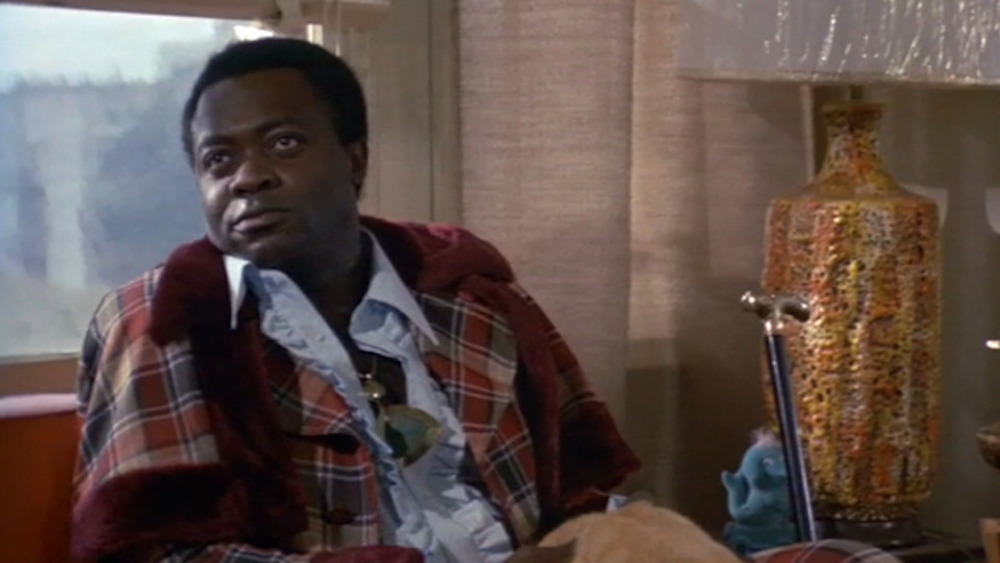Yaphet Kotto's Best On-Screen Performances
Legendary character actor Yaphet Kotto passed away in March 2021. He was 81, and he left behind a body of work that's to be reckoned with — a legacy of roles ranging from gritty crime dramas to social realism to crowd-pleasers to science fiction. It's easy to imagine how he could've had an even bigger career if he hadn't had to break through so many barriers. As director Ava DuVernay said, "He's one of those actors who deserved more than the parts he got. But he took those parts and made them wonderful all the same." And making the most of what he had was part of what Kotto wanted for his career legacy, as he told The Big Issue, "That was my plan, to play parts that would open up the doors for others, and it worked." He changed the game for those who followed after him.
He was distinctive, recognizable, and always welcome wherever he turned up, in part because of a powerful screen presence that made him stand out even when he was in the background. In a tribute to Kotto, Alan Sepinwall wrote, "You could not ignore Yaphet Kotto when he came on the screen." Let's take a look at the times when it was truly impossible to look away. These are the best on-screen performances of Yaphet Kotto.
Yaphet Kotto was an all-time TV character in Homicide: Life on the Street
Homicide: Life on the Street hasn't found a home on a streaming service, so it's fallen somewhat off the radar over the years. However, it was one of the most acclaimed shows of the '90s, and TV Guide ranked it in the top 60 series of all time. Realistic, gritty, and humane, it was a well-crafted and stylistically innovative cop drama that stood out from the pack. It boasted a terrific ensemble, and one of the highlights was Yaphet Kotto as Lieutenant Al "Gee" Giardello, a series regular from start to finish. Gee is a great leader — smart, tough, warm, caring towards his subordinates, and thoroughly committed to the job.
Kotto reliably turned in an excellent and nuanced performance, and — alongside colleagues like Andre Braugher and Clark Johnson — helped create more complex roles for Black actors on TV. That was something the world recognized, as he was nominated for the NAACP's Image Award for Outstanding Lead Actor for four years in a row. If the part wasn't made for him, it was at least stretched for him. The producers liked him so much that he changed his character from white and Italian-American to half-Black, half-Sicilian. In Rolling Stone's tribute to Kotto, TV critic Alan Sepinwall described how the show gave Gee room to transcend the normal, hidebound limits of the staid authority figure. Instead of that stock character, he was "incredibly rich ... given so much life and passion by the actor playing him."
He starred in a true horror classic — Alien
With science fiction and horror films, it's hard to get more essential than 1979's Alien, directed by Ridley Scott. And it's hard to improve on the film's supporting cast, with character actor luminaries like Harry Dean Stanton, John Hurt, and Ian Holm. Yaphet Kotto slots right into the team, and he totally belongs there.
As Alan Sepinwall noted in Rolling Stone, "Kotto's rapport with Harry Dean Stanton as Brett is what sells the melding of science fiction trappings with blue collar ones," and it helps blend the ordinary and the horrific. His character, Parker, is sharp, funny, and canny — memorable even without a ton of time to make an impression. It's one of the parts he's most remembered for, and apparently, Kotto could see that part of his legacy coming. Even before he got it, the role was important to him. In an interview with IGN, he explained that he turned down a chance at a sure thing — a role that would pay him a record $2.5 million, a huge jump in his career — to wait to hear back about Alien. That was a gamble that paid off.
Alien also had another, less obvious influence on his career. He didn't want to get typecast to the point of being limited to space-themed blockbusters, so after Alien, he turned down two parts that might've made his future look very different — Lando Calrissian in The Empire Strikes Back and Jean-Luc Picard in Star Trek: The Next Generation.
Yaphet Kotto tried to kill James Bond in Live and Let Die
James Bond has still only faced down one Black villain — Yaphet Kotto's Dr. Kananga, aka Mr. Big, in 1973's Live and Let Die.
It's a role that's ... not without its difficulties, to put it delicately. Kotto had a lot of problems with the script, and the Chicago Tribune quotes him as saying, "I had to dig deep in my soul and brain and come up with a level of reality that would offset the sea of stereotype crap that [the screenwriter] wrote." He didn't want to play a caricature. He wanted to be a Bond villain in the great, powerfully charismatic tradition of Bond villains. A great movie hero is, after all, only as good as his antagonist. And as Kotto told The Big Issue, "I had to play Kananga in a way that was so believable you became mesmerized. You see a guy who is completely together -– almost as together as James Bond himself."
His work paid off. As Alan Sepinwall wrote in Rolling Stone, "There's a clear intelligence and a wink to Kotto's performance, as if he's aware of just how ridiculous the Mr. Big persona, voodoo, and all the other affectations are, and is just using them as stagecraft." Looking at it that way, the stereotypes and inaccuracies in the role then — at least partly — become about Mr. Big's knowing deployment of them, changing uneven writing into real characterization of a clever and theatrical villain determined to twist everything to his own advantage.
He cracked us all up in Midnight Run
Few films are as purely enjoyable as 1988's Midnight Run, where Robert De Niro plays a dogged bounty hunter who has to haul a likable criminal (Charles Grodin) all the way across the country. They're pursued by both the mob and the feds, and the FBI team on their heels is headed up by Yaphet Kotto as Alonzo Mosely, a guy who just can't catch a break.
Kotto played a Bond villain and had a memorable part in Alien, but Midnight Run, as he told IGN, was the film of his that he heard about the most: "It's a big cult following, big, in Europe and everywhere else. And that guy [Alonzo Mosely], people think he's Inspector Clouseau or somebody. And they laugh every time they see him. I was trying to [do] comedy, and I think it worked."
It definitely works, and Rolling Stone called it "Kotto at his liveliest." Mosely is a great, memorable character, and it's a lot of fun to see Kotto in one of his rare comedic roles. One of the best running gags in the movie is that Jack (De Niro) has stolen Mosely's badge and keeps identifying himself as Mosely to the people he encounters, leaving the actual Mosely following in his wake and constantly hearing about what "he" has done. Kotto's simmering slow burn as he gets this again and again is beautiful to behold, as is his inevitable (and perfectly delivered) eruption, "I'm Mosely!"
He held his own alongside Schwarzenegger in The Running Man
The Running Man takes viewers into a futuristic dystopia where other viewers are also watching something called The Running Man — a hit reality TV show about criminals trying to evade government killers long enough to be awarded a pardon. Arnold Schwarzenegger stars as Ben Richards, and Yaphet Kotto plays William Laughlin, a resistance fighter who becomes one Richards' key allies.
There's a lot going on in The Running Man, but Kotto still makes an impact. Justin Harlan with Grumpire singled out Kotto as being especially fun to watch and added, "While The Running Man is very clearly an Arnold vehicle start to finish, it would be incomplete without the great work of Kotto." The performance has remained one of his most memorable roles, showing how much punch he could pack into a supporting performance. While the movie never really blew up as much as Kotto had expected it to, it's stayed in the cultural consciousness and has probably even grown more relevant with time. Along with Alien, it provides a great look at Kotto as a sci-fi actor.
The actor left a strong impression in Blue Collar
Released in 1978, Blue Collar was the directorial debut of Paul Schrader, who had just had a major success with the screenplay for Taxi Driver. Blue Collar has similar grit. Yaphet Kotto — starring alongside Richard Pryor, in a rare dramatic role, and Harvey Keitel — plays Smokey Jones, an ex-con in debt and chafing at the combined stranglehold of his bosses and his corrupt union leaders. He and his friends hatch a plan to rip off their union, that, in the grand tradition of crime films, doesn't go well.
Blue Collar received significant critical acclaim, and its performances were widely regarded as excellent. Roger Ebert ruled the whole trio of Pryor, Keitel, and Kotto to be "at the top of their forms." Even though Pryor's turn to drama understandably attracted a lot of attention, Kotto still stood out for many reviewers. Frederic and Mary Ann Brussat at Spirituality and Practice say, "Yaphet Kotto as Smokey, a streetwise and charismatic dude, is all thunder. His is a towering presence on the screen." That's an assessment seconded by The New York Times, where Vincent Canby says Kotto's character is "as much a matter of his sheer presence as it is of his cool, self-assured performance." This elusive, forceful sense of "presence" is one of the things Kotto does best, and his strength in Blue Collar makes his character's eventual absence all the more striking.
Yaphet Kotto is the highlight of Across 110th Street
Across 110th Street is a film full of conflict, bringing the Mafia, police officers, and Black gangsters all into conflict over the universal appeal of power and $300,000. Major tensions come into play as Yaphet Kotto's character, the upright Lt. Pope, tries to investigate a high-profile robbery-murder case while also managing a difficult relationship with his casually corrupt Italian-American partner (played by Anthony Quinn).
Across 110th Street got uneven reviews, with many critics finding it too pessimistic, too violent, and, in the aftermath of movies like In the Heat of the Night, too familiar. But its bleakness also won it admirers, even if they were sometimes reluctant. After all, the content of Across 110th Street is material where a sense of anger — whether crackling or weary — and grimness is understandable.
Anger is one of the traits Kotto brings to his role. The film blog Nothing is Written says Kotto is "controlled, his anger a marvelous slow boil until finally bursting towards the end." Bad Movies for Bad People also praises that sense of restraint, believing it suits Pope's rigorously "by the book" approach, adding, "Kotto absolutely gets his character here, and it really is refreshing to see him be willing to [undersell] his performance for the good of the movie as a whole." This nails how consistently great Kotto is in supporting roles. Always vivid, he nonetheless unfailingly respects the feel of the film as a whole and is willing to go small when necessary.
Brubaker cast the actor alongside a Hollywood legend
Released in 1980, Brubaker is based on a true story about prison reform in Arkansas. Robert Redford plays the title character, who's a new warden who first masquerades as a prisoner to learn the true conditions of his job. Yaphet Kotto is Dickie Coombes, a prison trusty — an inmate given a small degree of freedom and power — who aids him in his quest to improve the prison and eventually becomes one of his most faithful adherents.
Brubaker was a success, the 16th highest-grossing film of the year. Kotto's grounded portrayal of Coombes' skepticism worked well, even for reviewers who largely found the film too stolid and unsurprising. The Washington Post praised the movie's supporting cast, with Kotto as the first mentioned, and Roger Ebert singled his character out as being especially interesting and deserving of more exploration. Journeys in Classic Film's retrospective review took the position that the movie's most interesting scenes were when Kotto and Redford got to act opposite each other, calling them both "equally stellar." It takes considerable chops and presence to share the screen with Robert Redford as an equal, and Kotto's ability to do so proves that he packed movie star charisma into a character actor's career.
He made a huge impression with his first film, Nothing but a Man
In 1964, Yaphet Kotto made his big-screen debut in Nothing but a Man, Michael Roemer's sleeper classic of social realism. The film revolves around the ordinary life of Duff Anderson (Ivan Dixon), a Black railroad worker in small-town Alabama, and a young Kotto plays Jocko, Duff's coworker who advocates a seamier life of lower expectations. He's simultaneously more laidback than his friend and more pessimistic about their options.
It took years for Nothing but a Man to get the reception that it deserved. Its initial release had left it with a positive reputation, but it took an early '90s restoration and re-release to get it proper exposure. Roger Ebert praised it and added, "For the actors, Nothing but a Man might have been a launching pad for many other roles, had it been more widely seen."
It's hard to say what the impact on Kotto's career would've been if his first film hadn't vanished into well-regarded obscurity. It easily could have made some difference. Michael Phillips, with The Baltimore Sun, noted, "It's not much of a part, but straight off, Kotto knew exactly how much to do on screen, how to let his marvelous face and 6-foot-3-inch frame work for him, how to get our attention without grabbing it." In other words, the famous Konstantin Stanislavski, who helped develop modern acting, coined the best phrase for describing Kotto: "There are no small parts, only small actors." Right from the start, Kotto knew how to make an outsized impact.
Yaphet Kotto played a terrifying figure in Raid on Entebbe
Operation Entebbe, the real-life rescue mission of hostages in a Ugandan airport, has been irresistible to filmmakers, with NBC's Raid on Entebbe being only one of many takes on the tale. In this TV film, Yaphet Kotto plays Idi Amin — the kind of terrifying, weighty part that can intimidate actors but be a great opportunity. His Amin is jovial but undeniably frightening, his manner expansive even as his actions are deadly.
For Kotto, it was a great opportunity — one he took full advantage of. His career went largely unnoticed by most awards organizations, but Raid on Entebbe succeeded in snagging him his only Emmy nomination — richly deserved — for Outstanding Performance by a Supporting Actor in a Comedy or Drama Special. A lot of TV movies quickly vanish from the entertainment landscape, but Raid on Entebbe still gets remembered, and so does Kotto's performance. In a segment on his memory, Elizabeth Blair on NPR's All Things Considered picked it out as one of his signature roles, saying, "Yaphet Kotto could intimidate in one scene and charm in the next. In the 1976 TV movie Raid On Entebbe, he did both as the brutal but charismatic dictator Idi Amin."
Truck Turner proved he was always great, no matter what
In 1974, AIP released Truck Turner on a double bill with the Pam Grier-starring Foxy Brown, with both films among the most notable the Blaxploitation genre has to offer. (A staple of the 1970s, Blaxploitation was often a mixed bag, offering both exploitation — it's right there in the name — and an electric celebration of street-level Black life, tough female leads, and larger-than-life antiheroes.) Truck Turner centers on the titular bounty hunter who strides into a seedy, violent case involving sex work. Yaphet Kotto plays Harvard Blue, a pimp who tries to enlarge his empire by taking Truck on.
One of the great parts of Kotto's career was getting to work with a number of really great stars, and Truck Turner has an exceptional cast — soul legend Isaac Hayes, Star Trek's Nichelle Nichols, and Scatman Crothers, among others. Kotto is in good company here, and the film is a good match for his standout presence. According to DVD Drive-In, Kotto felt like the film was a step down for him, but that ambivalence doesn't come through in his performance, which offers "his usual engrossing professionalism." He always excelled at playing villains, and Truck Turner is no exception. Cinema Retro said, "Kotto is terrific, as usual, managing to steal scenes in his own unique, low-key way."
Combining those two reviews shows another of Kotto's strengths — he was remarkably consistent. When he left us glued to the screen, it was just business as usual. Doing good work was just part of who he was.
